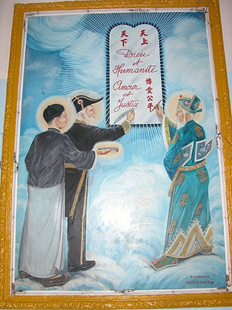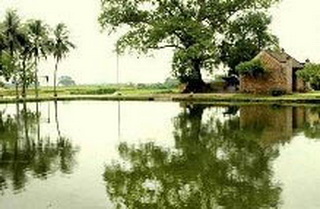Nhàn (Leisurely Life)
Nhàn
Một mai, một cuốc, một cần câu
Thơ thẩn dầu ai vui thú nào.
Ta dại, ta tìm nơi vắng vẻ,
Người khôn, người đến chốn lao xao.
oOo
Thu ăn măng trúc, đông ăn giá
Xuân tắm hồ sen, hạ tắm ao.
Rượu đến gốc cây ta sẽ nhắp,
Nhìn xem phú quý tựa chiêm bao.
Nguyễn Bỉnh Khiêm
(Bài thơ Nôm số 79 trong “Bạch Vân quốc ngữ thi tập”)
Leisurely Life.
A spade, a hoe, a fishing rod,
Strolling my way, while others take pleasure in other things,
I am a fool looking for deserted spots,
Smarter people would prefer tumultuous places.
I eat bamboo shoots in fall, bean sprouts in winter,
I bathe in the lotus lake in spring, in the pond in summer,
My rice wine, I will take a few sips at the base of a tree,
Wealth and honours will appear like a dream.
Translated by Hien V Ho
10/23/20
Nguyễn Bỉnh Khiêm was a Vietnamese administrator, educator, poet and sage, and currently venerated as a saint of the Cao Dai religion in Vietnam (1)
Fig 1: A painting inside the Tây Ninh Cao Dai Holy See depicts the three saints signing an accord between God and Humanity. From left to right: Sun Yat-sen, Victor Hugo and Nguyễn Bỉnh Khiêm (Source Wikipedia)

He was born in 1491 in Cổ Am village (now part of Hai Phong, Vietnam), during a prosperous period under King Lê Thánh Tông’s reign, in a family with strong Confucian and Taoist learning traditions. In 1535, under the Mạc dynasty (which had seized power since 1527), at the late age of 44, he passed the highest level of official competition, the court exam (Thi Đình , Đình thí, Điện thí), as the first laureate (Trạng nguyên). He served in the Mạc Dynasty court for just seven years, until 1542 when he resigned after his official complaints of government corruptions were ignored. He then returned to his native village and opened a school.
Nguyễn Bỉnh Khiêm was sought after by many leaders during that time of upheaval, civil war, with the Mạc’s collapse, and the rise of the Trịnh Lords and Nguyễn Lords. Both Trịnh Kiểm and Nguyễn Hoàng purportedly sought his advice in their pursuit of power. To the former, he gave the advice of being the real power behind the (restored) Lê Dynasty. To the latter, he advised building a base of power in the undeveloped area south of Quảng Bình Province and recently annexed from the Champa kingdoms, beyond Hoành Sơn Mountain : “Hoành Sơn nhất đái, vạn đại dung thân” (One Transverse Mountain Range provides protection for ten thousand generations). The Nguyễns eventually became the most powerful royal dynasty of Vietnam’s history and the unifier of the country.
Nguyễn Bỉnh Khiêm was also a poet, composing many poems in Sinitic Chinese and Nôm that have survived to this day. There is a long poem attributed to him called Sấm Trạng Trình (讖狀程, The Prophecies of Trạng Trình). Sấm Trạng Trình is the Vietnamese equivalent of the Nostradamus quatrains. It is believed to predict future events in a very mysterious way.(2)
Regarding Nguyễn Bỉnh Khiêm’s role in Vietnamese poetry the following is a translated quote from the French encyclopedia Larousse (3):
“The sixteenth century sees civil war ravage the country for many years. Only one great name remains: Nguyên Binh Khiêm (1491-1585), also known under the name of Trang Trinh and under the pseudonym of Bach Vân. Bach Vân's Poems in the National Language take up themes dear to Nguyên Trai (15th century): love of moderation, praise of simplicity, delights of rural life. They also touch on the troubled existence of the moment. The language has evolved: it has gained in lightness and is more accessible to the reader. The moralizing purpose of the writings also shines through more strongly.
The fame of this author also comes from his Prophecies, whose original text has disappeared and which are known to us only through multiple successive translations. But, in opposition to that of poems, the vocabulary presents frequent obscurities, giving rise to the most varied and contradictory exegeses.
Then, with the internal struggles gaining momentum, a long century passes, during which no author or work leaves a lasting mark.”
References and notes:
1) “Khiêm” is the name of the 15th hexagram (quẻ) of I Ching or 謙 “qiān” in Chinese )
Named at birth as Nguyễn Văn Đạt, he is also known under other names which reflect the different aspects of his life: his pen name (tên tự) Hanh Phủ (亨甫, “the learned one”; “hanh” is a property of the 15 hexagram qiān ), his alias (hiệu) Bạch Vân cư sĩ (白雲居士, White Cloud Hermit; “Bach Van” is the name of a branch of Vietnamese Zen Buddhists centuries before) and Trạng Trình (from his academic title as first laureate doctor, Trạng nguyên, and his nobility title as a count, Trình Quốc công” (程國公); this nickname usually refers to his reportedly uncanny abilities to predict future events.)
According to Đỗ Tiến Bảng: “ Riêng hiệu Bạch Vân cư sĩ, ông lấy hiệu từ Bạch Vân am. Theo Gs Bùi Văn Nguyên, trong sách Nguyễn Bỉnh Khiêm, tên này là tên có sẵn, trong dòng Thiền phương Bắc có chi phái Bạch Vân động, người tu thiền dựng Bạch Vân am. Đời Trần, sư Pháp Loa và Huyền Quang dựng Bạch Vân am ở Côn Sơn ( Chí Linh, Hải Dương), rồi Trần Nguyên Đán và Nguyễn Trãi đều ở đó ( cả Thiền sư, hiền sĩ ). Nhưng Nguyễn Bỉnh Khiêm không phải người tu thiền ẩn dật, trong hai chữ Bạch Vân, thì “bạch” là chính. “Bạch” màu trắng thuộc quẻ “tốn”( Bát quái) tượng gió; gió thổi mới sạch bụi, thì đời mới trắng và sáng ra. Bạch Vân am chính là Bạch ốc- Nhà trắng, nơi Chu Công Đán phụ chính Thành Vương từng ở. Chu biết dùng Bạch đạo, tức Minh đạo mà thành công ( Nxb Hải Phòng, 1986 ). Nguyễn Bỉnh Khiêm muốn thâu tóm nhiều ý trong đặt tên am, để lấy tên hiệu cho mình. Bạch Vân am là nơi ở để lánh việc triều đình, làm nghề dạy học, đem đạo sáng tỏa khắp cho đời, giúp vua trị nước yên dân.
2) Wikipedia (accessed 10/23/20)
https://en.wikipedia.org/wiki/Nguy%E1%BB%85n_B%E1%BB%89nh_Khi%C3%AAm
3) Larousse Archives: Viet-Nam: Les écrits en caractères nationaux: Essor de la poésie
https://www.larousse.fr/archives/grande-encyclopedie/page/14466) (accessed 10/23/20)
Hien V. Ho
10/24/2020















